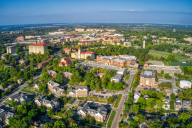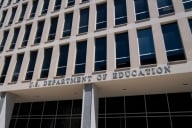You have /5 articles left.
Sign up for a free account or log in.
While the liberal leanings of professors have been well documented, the political affiliations of administrators have not been explored so thoroughly -- at least until now. And perhaps unsurprisingly, this new research suggests that student affairs officials wing even further to the left than do faculty members.
The analysis comes from a moderate-conservative professor of politics at Sarah Lawrence College, Samuel J. Abrams, who wrote in an essay in The New York Times on Tuesday that he was taken aback at “politically lopsided” programming at his institution that he said seemed to only capture a liberal viewpoint.
He decided to survey student affairs professionals -- 900 “student-facing” administrators across the country, at public and private colleges and universities both large and small, and two- and-four year institutions, to identify political affiliation. Abrams found that liberal student affairs leaders outnumbered conservatives 12 to one, with only 6 percent of administrators indicating they were conservative versus 71 percent identifying as liberal or very liberal.
In an interview with Inside Higher Ed, Abrams said he worked with the National Opinion Research Center at the University of Chicago this year to carefully develop the survey sample. Previously, he has relied on data from Higher Education Research Institute at the University of California, Los Angeles, to determine that liberal professors are far more common than conservatives by a six-to-one ratio.
Abrams said in his interview that early on, students are exposed to an entirely liberal tenor, starting with orientation week classes.
“This warped ideological distribution among college administrators should give our students and their families pause,” Abrams wrote in the Times. “To students who are in their first semester at school, I urge you not to accept unthinkingly what your campus administrators are telling you. Their ideological imbalance, coupled with their agenda-setting power, threatens the free and open exchange of ideas, which is precisely what we need to protect in higher education in these politically polarized times.”
In defense, Kevin Kruger, president of NASPA: Student Affairs Administrators in Higher Education, said that traditionally the field has attracted progressives who are interested in promoting equity and inclusiveness for students of all races, sexual orientations and gender identities.
But still, among those professionals is a strong desire to create “an equal and open dialogue across ideologies,” Kruger said. Simply because administrators hold a certain set of beliefs doesn’t mean they are bleeding into their professional lives, he said. Kruger said he also didn’t see a need to try to balance more conservative-centric events with liberal programming.
“Are students treated fairly? Are different perspectives given equal footing? I would say there is no evidence to suggest that students affairs professionals block more conservative speech,” Kruger said, adding that at times, administrators come under fire from the more progressive student activists who question why they would allow conservative speakers on campus.
Chris Moody, acting executive director of ACPA: College Student Educators International, declined to comment for this story.
But Matthew C. Woessner, an associate professor of political science at Pennsylvania State University Harrisburg, disagrees. Woessner, a Republican who has written about ideological diversity in higher education, said that student affairs administrators are not shy about overtly sharing their political beliefs, compared to professors, who are less inclined to do so. Even though faculty sometimes inject their politics into the classroom, administrators without an academic background don’t always see the same need to balance viewpoints or inspire debate, he said. Sometimes administrators aren’t even aware of how insular their beliefs are, Woessner said.
These narrow beliefs are disenchanting for half of the country -- the GOP -- and reflect poorly on higher education, Woessner said. Recent research shows conservatives especially don’t appreciate higher education.
“I don’t think it is in the interest to develop a reputation for being one-sided,” Woessner said. “Putting aside whether it’s desirable whether you have liberal or conservative speakers on campuses, it’s harmful to the college’s mission in being overtly political. You alienate half of the taxpayers, and make higher education be an arm of the Democratic National Committee.”
Abrams suggested involving faculty members from other ideologies who could bring more rounded perspectives to certain issues. He said many professors simply teach and focus on research when they could be more involved with university dealings.
The Foundation for Individual Rights in Education, a civil liberties watchdog group in academe that has criticized many student affairs leaders for denying opportunities to conservatives, said groups that don’t diversify their viewpoints are at risk for developing “groupthink.”
“Student life administrators aren't immune to this effect, and as they have taken on a greater role in regulating all aspects of students' lives, this myopia has become an increasing reason for concern,” Robert Shibley, FIRE’s executive director, said in a statement.








